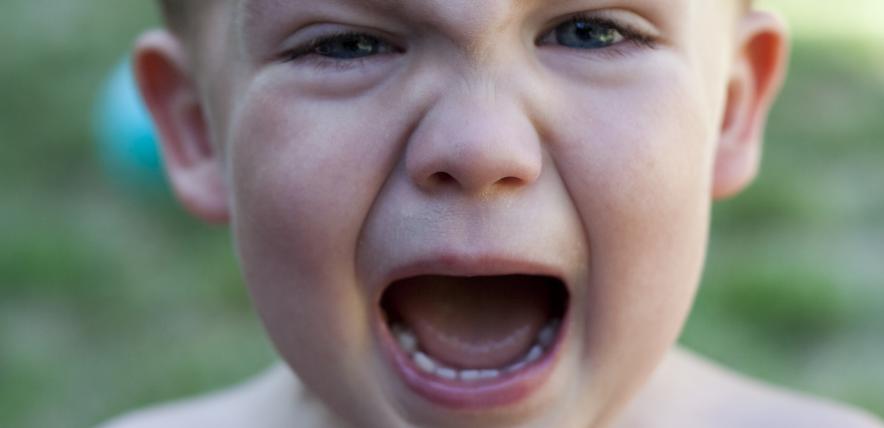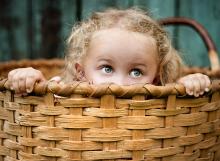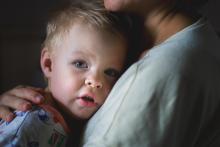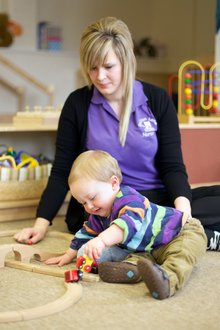Are the 'terrible twos' real?
Watching your child grow up is exciting. From that first lopsided smile and those first shaky steps, you’re gripped. Sleepless nights and dirty nappies seem like a small price to pay for the hours of joy they bring you each day. But then, they turn two. Out of nowhere, your child has turned from happy peaceful baby to red-faced, screaming and on a warpath.
This change in a child’s behaviour can make even the most confident and calm of parents feel that they must have done something terribly wrong. But before you start searching for miracle cures, bear in mind that for most two year olds this type of behaviour - although it can be unsettling for us parents - forms part of normal child development. At this age your child is growing rapidly and having to deal with so many new and often challenging experiences, which sometimes they just aren’t developmentally ready to deal with yet.
During the next few years your child will learn to follow rules, take turns, be considerate and helpful, solve problems and regulate their own behaviour - but until then, these are difficult skills to master (even for some adults!) let alone for two year olds. At two these skills are still immature and quickly forgotten or awkwardly delivered, so it’s almost inevitable your child will have occasional (and even regular) ‘melt downs’ - especially when they can’t get what they want or be understood.
These ‘melt downs’ may carry on until your child has developed the skills needed to deal with difficult situations. During this time they will needs lots of support and continuity from you and the people they are closest to - and of course for you to be extremely patient! This includes avoiding negative ways of describing your child or their developmental stage - such as 'terrible twos' or 'troublesome toddler' - these terms may seem harmless, but very young children can pick up on the negative tone behind them, and this can have the unintentional side-effect of reinforcing negative behaviours, as children can interpret this to mean that they are 'bad' or 'naughty', instead of just the undesirable behaviour or actions.
What can I do about it?
Many of these skills are really only mastered when your child has learnt to reflect and reason for themselves. At this early age you are far better modelling behaviour you want your child to copy such as being kind and considerate to others. Try to avoid situations which are known for causing issues with young children, such as disputes over sharing toys – just make sure there are enough toys to go around! Although you may feel this is avoiding the problem, as your child grows and their reasoning skills improve, they’ll be much better able to understand concepts such as ‘taking turns’, and are therefore more likely to take on board instructions like these – but only when they are old enough to really understand what you’re asking them to do. Allow them to develop these skills over time, and by demonstrating how you want your child to behave. You’ll find as time goes on, as they see you modelling good behaviour and begin to understand more complex ideas, you can then help them to navigate more complex social expectations and situations, until they are able to do so on their own.
What about when push comes to shove?
But what if you find yourself in an unavoidable situation and your child has given another child a shove to get a turn with today’s most popular toy? Well a certain amount of ‘spirited’ communication between young children is good and helps your child start to problem solve and communicate more effectively, but if a gentle nudge was actually a hefty shove, and the other child is now howling, then it’s time to roll up your sleeves and wade in! Your reaction to this and future incidents should always be measured and consistent. The first thing to remember is to keep calm both in your tone of voice and body language. Comfort the other child first and once you have checked that the other child is okay, then talk to your own child.
There is no point trying to reason with a two year old or tell them to say sorry because they just won’t get it at this age. Defining what sorry means is difficult for most two year olds to understand because it is a difficult concept to grasp. To understand the connection between hurting others, feeling remorse and making amends, children need to become selfless and considerate and these skills come later on.
The best response when your child has hurt someone or done something that you don't want them to do is to simply say no and give the reason why such as “No don’t hit Sammy. You’ve hurt him”. If the situation has become very fraught then sometimes it is better to just remove your child to a quieter place and switch the focus to get them to calm down. When they are older and can understand what has happened you can use this time to help them reflect on their behaviour and what they could have done differently.
Practice makes perfect
What else can you do to guide your child’s behaviour? Well socialising your child early in life will certainly help your child get used to other children and practice all those crucial social skills. Take your child to a parent and toddler group or the playground so they can meet other children. But be prepared to anticipate situations which your child may find difficult and take along some favoured toys to provide timely distraction.
Sometimes your child may be copying behaviour they have seen, so you need to keep a check on other children’s and adult's behaviour around your child. Is their behaviour really the sort you want your child to copy?
Often toddlers will ‘act out’ because they are struggling to manage powerful emotions which they are too young to fully understand. You can help your child explore and name strong and sometimes difficult feelings by sharing books with them such as Not now Bernard (David McKee), Dogger (Shirley Hughes), Noisy Nora (Rosemary Wells) and Where The Wild Things Are (Maurice Sendak). Once you have an idea of what emotions they are struggling with, you can give them some gentle suggestions to help them cope. For example – your child is angry because you told them you can’t take them to the park today. You might suggest they help let go of their angry feelings by running around, jumping up and down, painting an angry picture – anything you feel is appropriate. This will help your child to understand that it is ok to have strong emotions, and that you can help them to learn how to manage those feelings in a positive way.
If you feel like things are getting worse
What happens if their behaviour doesn’t improve or even deteriorates? You need to think back to when the behaviour first started. Can you think of a trigger such as a new baby in the family or a recent start in nursery? All these and other influences can impact negatively on your child’s behaviour. If there is no obvious cause then talk to your health visitor and if your child is in childcare you can ask their childcare setting for advice. Remember most children grow out of these behaviours by the age of three but from time to time when they are hungry or tired they will revert right back. Remember to stay calm, carry on and above all be consistent because this stage doesn’t last for ever!
Written for the Pre-school Learning Alliance by Nicola Gibson, Inclusion Manager at the Alliance.







